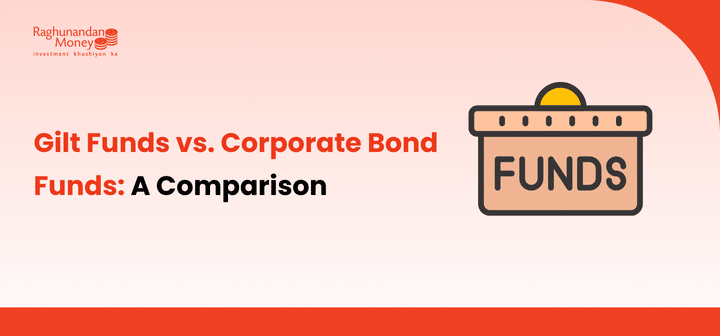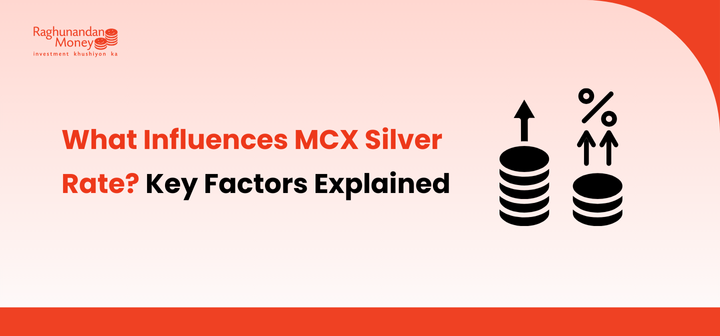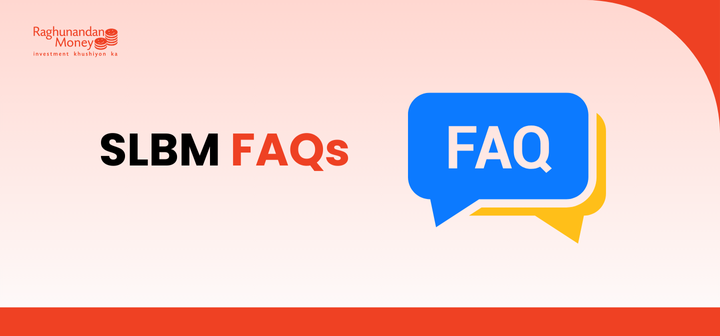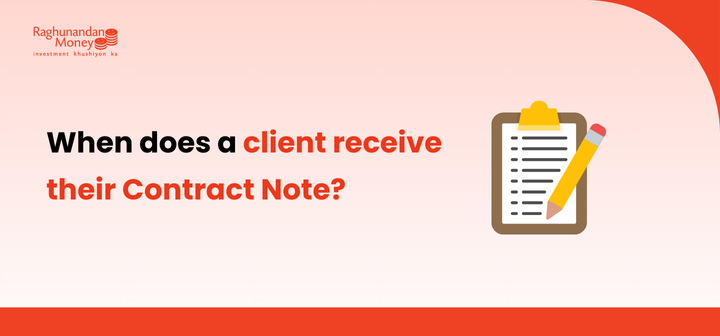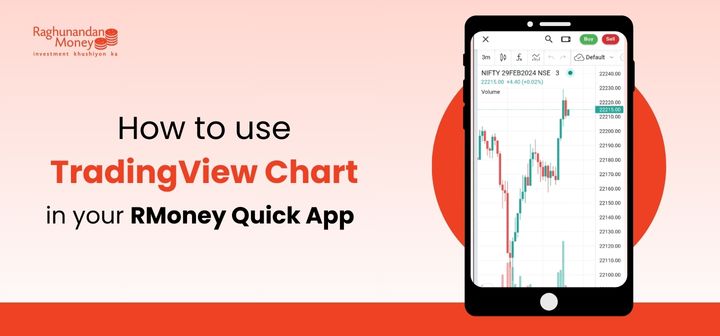Gilt Funds vs. Corporate Bond Funds: A Comparison
Disclaimer: Investments in the securities market are subject to market risks. This content is for educational purposes only and does not constitute financial advice.
What are Gilt Funds?
Gilt funds are mutual funds that primarily invest in government securities (G-Secs). These securities are debt instruments issued by the Central Government or State Governments to raise funds for public expenditure. Since they come with a sovereign guarantee, gilt funds carry no default risk and hold a high credit rating.
The issuance of G-Secs is facilitated through the Reserve Bank of India (RBI). The term “gilt” signifies their safety and reliability, making them a preferred choice for conservative investors.
Types of Gilt Funds
- Gilt Fund
Gilt funds actively invest in government securities with varying maturities. These may include short-duration securities (1-3 years) or long-term papers with maturities ranging from 10 to 15 years.
As per SEBI regulations, at least 80% of a gilt fund’s portfolio must be allocated to government securities. The remaining 20% is typically invested in Treasury bills (T-bills), cash-equivalent securities, certificates of deposit, and commercial papers.
- Gilt Fund with 10-Year Constant Maturity
This category maintains exposure to government securities with fixed 10-year maturities, as mandated by SEBI. Like standard gilt funds, at least 80% of the portfolio is allocated to government securities.
Features of Gilt Funds
- Investment in Government Securities – Gilt funds primarily invest in central and state government bonds, making them one of the safest investment options.
- Low Credit Risk – Since the government backs these funds, the risk of default is minimal.
- Stable Returns – Gilt funds provide stable returns over time, but they are subject to interest rate movements.
What are Corporate Bond Funds?
Corporate bond funds are mutual funds that invest at least 80% of their financial assets in corporate bonds. Businesses issue these bonds to raise capital for operations, expansion, and short-term expenses such as advertising, insurance, and working capital.
Types of Corporate Bond Funds
Corporate bond funds primarily invest in:
- Highly Rated Companies (AA+ or above) – These include bonds issued by large, stable corporations, public sector undertakings (PSUs), and Navratna firms.
- Lower-Rated Corporate Bonds – These bonds offer higher potential returns but come with increased risk.
Features of Corporate Bond Funds
- Investment in Corporate Bonds – These funds invest in corporate debt instruments, which generate periodic interest income.
- Potentially Higher Returns – Since corporations, unlike governments, can default, investors assume a slightly higher risk in exchange for better returns.
- High Liquidity – Corporate bond funds offer better liquidity compared to individual corporate bonds, making them easier to trade.
Gilt Funds vs. Corporate Bond Funds
The following table highlights the key differences between these two fund types:
| Aspects |
Gilt Funds |
Corporate Bond Funds |
| Underlying Securities |
Primarily invest in government securities |
Invest in bonds issued by corporations |
| Risk |
Low due to government backing |
Moderate to high due to corporate risk |
| Credit Risk |
Minimal (sovereign guarantee) |
Higher (corporate default risk) |
| Returns |
Lower but stable |
Potentially higher but riskier |
| Investor Profile |
Suitable for conservative investors |
Suitable for investors with a higher risk appetite |
Gilt Funds or Corporate Bond Funds – What to Choose?
- Risk Tolerance
If you have a low-risk tolerance, gilt funds are a safer option, as they are backed by the government. Corporate bond funds, on the other hand, are better suited for investors willing to take moderate risk in exchange for higher potential returns.
- Investment Horizon
- Gilt funds are ideal for long-term investors seeking stability and consistent returns.
- Corporate bond funds are suitable for medium to long-term investors looking to balance income generation with capital appreciation.
- Return Expectations
- Gilt funds offer lower but stable returns, making them suitable for capital preservation.
- Corporate bond funds may offer higher returns, but they come with increased credit risk.
- Market Conditions
Gilt funds perform well during a falling interest rate environment, as bond prices rise when rates decline. Corporate bond funds perform well when the economy is growing, leading to stronger corporate performance and reduced default risks.
FAQs on Gilt Funds vs. Corporate Bond Funds
- What is the Best Time to Invest in Gilt Funds?
The best time to invest in gilt funds is during a falling interest rate regime. As interest rates decline, the prices of government securities rise, leading to higher fund returns.
- Are Gilt Funds Safe?
Yes, gilt funds are highly safe since they invest exclusively in government securities, eliminating credit risk.
- Who Should Invest in Corporate Bond Funds?
Corporate bond funds are ideal for moderately high-risk investors with an investment horizon of 2-3 years.
Kickstart Your Investment Journey with RMoney–Open your Demat Account today and take the first step toward smarter, safer investing.
Need Help?
Contact RMoney:

Stock Trading Now trade in ₹9 Per Order or ₹ 999 Per Month Plans.
Future & Options Access F&O contracts with advanced tools for hedging and speculation.
Currency Trading Trade in major currency pairs and manage forex exposure efficiently.
Commodity Trading Diversify Trading with MCX & NCDEX by Trading in Gold, Silver, Base Metals, Energy, and Agri Products.
Margin Trading Funding Boost your buying power with upto 5X, Buy now Pay Later
Algo Trading Back test, Paper Trade your logic & Automate your strategies with low-latency APIs.
Trading View Leverage Trading View charts and indicators integrated into your trading platform.
Advanced Options Trading Execute multi-leg option strategies with precision and insights.
Stock Lending & Borrowing Earn passive income by lending stocks securely through SLB.
Foreign Portfolio Investment Enable NRIs and FPIs to invest in Indian markets with ease and compliance.
IPO Invest in upcoming IPOs online with real-time tracking and instant allotment updates.
Direct Mutual Funds 0% Commissions by investing in more than +3500 Direct Mutual Fund Scheme.
Corporate FDRs Earn fixed returns with low-risk investments in high-rated corporate fixed deposits.
Stocks SIPs Build long-term wealth with systematic investment plans in top-performing stocks.
Bonds & NCDs Access secure, fixed-income investments through government and corporate bond offerings.
Depository Services Safely hold and manage your securities with seamless Demat and DP services with CDSL.
Journey Tracing our growth and milestones over time.
Mission & Vision Guided by purpose, driven by long-term vision.
Why RMoney Platform Smart, reliable platform for all investors' needs.
Management Experienced leadership driving strategic financial excellence.
Credentials Certified expertise with trusted industry recognition.
Press Release Latest company news, updates, and announcements.
Testimonials Real client stories sharing their success journeys.
7 Reasons to Invest Top benefits that make investing with us smart.
SEBI Registered Research Trusted insights backed by SEBI-compliant research.
Our Technology Advanced tools enabling efficient online trading.
Calculators Access a suite of smart tools to plan trades, margins, and returns effectively.
Margin Calculator Instantly check margin requirements for intraday and delivery trades.
MTF Calculator Calculate MTF funding cost upfront to ensure full transparency before placing a trade.
Brokerage Calculator Know your exact brokerage charges before placing any trade.
Market Place Explore curated investment products and trading tools in one convenient hub.
RMoney Gyan Enhance your market knowledge with expert blogs, videos, and tutorials.
Performance Tracker Track our research performance with full transparency using our performance tracker.
Feedback Share your suggestions or concerns to help us improve your experience.
Downloads Access important forms, software, and documents in one place.
Locate Us Find the nearest RMoney branch or service center quickly.
Escalation Matrix Resolve issues faster with our structured support escalation process.
Back Office Log in to view trade reports, ledger, and portfolio statements anytime.
Account Modification Update personal or bank details linked to your trading account.
Fund Transfer Transfer funds instantly online with quick limit updation to your trading account.
Bank Details View our registered bank account details for seamless transactions by NEFT, RTGS or IMPS.
How to Apply IPO Step-by-step guide to apply for IPOs using your trading account.
RMoney Quick Mobile App Trade on-the-go with our all-in-one mobile trading app.
RMoney Quick login Quickly access your trading account through the RMoney Quick web-based trading.
RMoney Rocket Web Version Experience powerful web-based trading with advanced tools for algo traders.
RMoney Rocket Mobile Version Trade anytime, anywhere with our feature-rich mobile trading platform.
